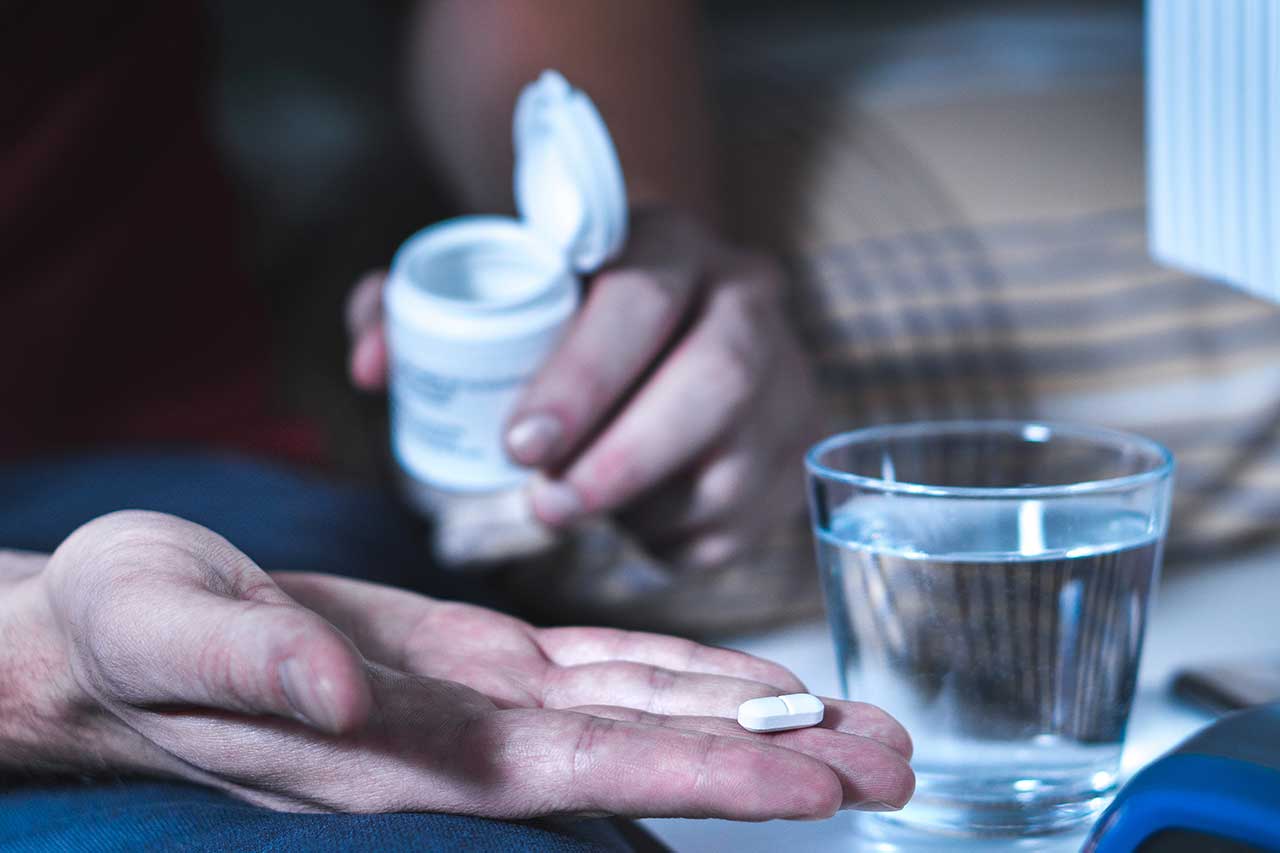
Can You Overdose on Sleeping Pills?
March 1, 2022
Signs of Nicotine Overdose: How Much Vaping Is Too Much?
March 22, 2022
Can You Overdose on Sleeping Pills?
March 1, 2022
Signs of Nicotine Overdose: How Much Vaping Is Too Much?
March 22, 2022
Vicodin vs. Valium
Valium and Vicodin are used for different reasons and are listed under two separate drug classifications. What is Valium? Valium (containing active ingredients of diazepam) is a benzodiazepine often used to treat anxiety disorders, seizures, restless legs syndrome, and stress. Valium acts by affecting neurotransmitters and releasing chemicals to facilitate nerve communication in the brain. After consumption, the drug is delivered throughout the body quickly. Effects happen in thirty to sixty minutes.
On the other hand, Vicodin has active ingredients of acetaminophen and hydrocodone bitartrate. Unlike Valium, which can be used to treat mental health issues, this drug can not be used to treat moderate to severe pain. Vicodin typically relieves symptoms of pain for up to six hours, and many people build a tolerance to the drug. It is important to know the different factors of Vicodin vs. Valium since they are prescribed for different causes.
What are opiates and how do they work in the body?
Opiates, also known as opioid prescription painkillers, are medications that interact with opioid receptors in the brain to alleviate intense pain sensations in the body. These drugs are commonly derived from the opium poppy plant and function by inhibiting the transmission of pain signals from various body regions to the brain. Doctors often prescribe opiates post-surgery, such as after a wisdom tooth extraction, or for managing persistent pain associated with conditions like arthritis or cancer. In essence, opiates work by binding with specific receptors in the brain to effectively reduce the perception of pain, providing patients with relief in situations where pain management is paramount.
What is Vicodin and what is it used for?
Vicodin is a prescription medication classified as an opioid analgesic. It is formulated by combining hydrocodone, which is the opioid component, with acetaminophen, the non-opioid pain reliever. This drug is primarily prescribed to manage moderate to severe pain that may occur following medical procedures or from physical injuries. The effectiveness of Vicodin comes from its ability to alter the way the brain and nervous system respond to pain.
What to Know About Valium and Vicodin
Vicodin is an opioid painkiller and is known for relieving pain that stems from injuries or surgery. Valium works by calming the brain and nerves and is used for long-term mental or physical purposes. Depending on the condition determines how long Valium lasts, though it usually lasts up to six hours, whereas Vicodin may last as long as four hours.
Side effects of the drugs differ as one may seem more intense than the other. Common side effects of Valium include increased depression, disorientation, aggression, and tiredness. If you are wondering about the use of Valium for sleep, the drug is not a sleeping pill and is not advised.
Vicodin’s side effects include confusion, slowed breathing, impaired judgment, nausea, constipation, and loss of consciousness. More people tend to take higher doses of the drug, which leads to a Vicodin addiction.
What is Valium and how does it work?
Valium is a medication belonging to the benzodiazepine class, which is frequently prescribed to manage anxiety. It functions by modulating neurotransmitters in the brain, which are chemicals essential for nerve communication, thereby decreasing activity in the brain and spinal cord. Typically, Valium begins to exhibit its effects within thirty to sixty minutes of administration. In addition to treating anxiety, it is also utilized for controlling seizures, relaxing muscles, and as a component in certain anesthesia protocols. Some of the more common side effects associated with Valium include feelings of dizziness, depression, disorientation, sedation, as well as aggression, irritability, and fatigue.
Can I take both Valium and Vicodin together?
Combining Valium, a benzodiazepine, with Vicodin, an opioid, is highly risky and can lead to severe health complications including coma or death. This mix can occur mistakenly due to prescriber error or intentionally by patients seeking to amplify the drugs' effects. It is crucial to only use these medications together under strict medical supervision, if at all, to avoid dangerous interactions.
Why is the abuse of opiates and benzos concerning?
The abuse of opiates and benzos is concerning due to the heightened risks and dangers that arise from combining these medications. Reports have shown that mixing opioid medications and benzodiazepines significantly increases the likelihood of overdose, necessitating emergency medical attention. This dangerous combination primarily results in decreased breathing function and exaggerated sedation, which can be life-threatening if immediate medical assistance is not obtained.
What should be done if a person overdoses on benzodiazepines or a combination of medications?
If a person overdoses on benzodiazepines such as Xanax or Valium, painkillers like Vicodin or oxycodone, or a combination of these medications, it is crucial to seek immediate emergency medical assistance. The recommended course of action is to call 911 and remain with the individual until medical help arrives.
Can You Combine Valium and Vicodin?
Valium and Vicodin are sometimes consumed together, but this combination is a dangerous occurrence since the interaction of benzodiazepines, and opioid medications can result in coma or death. According to the U.S. Food & Drug Administration (FDA), the combination of these drugs can adversely affect an individual by depressing their breathing. It is never a bad idea to compare the drugs, maybe write out a Valium vs. Vicodin list and make sure the correct drug is being properly used. Due to the drugs being listed separately, since they are used for separate uses, a person should not try to enhance the effects of both drugs or wish for faster results by taking the drugs together.
What are the symptoms of benzodiazepine overdose?
The symptoms of benzodiazepine overdose may include confusion, slow or shallow breathing, and unresponsiveness, whether the individual is awake or unconscious.
Why is it dangerous to combine Valium or Xanax with Oxycodone or Vicodin?
Combining Valium or Xanax with Oxycodone or Vicodin can be extremely dangerous due to the synergistic effects of these medications. Both opioid painkillers like Oxycodone and Vicodin and benzodiazepines such as Valium and Xanax have high potential for addiction and abuse when used independently. When these drugs are combined, they can amplify each other's effects, leading to increased sedation and respiratory depression. This combination can be particularly risky as benzodiazepines enhance the euphoric effects of opioid painkillers, potentially leading to a greater risk of overdose.
Statistics show that a significant number of prescription painkiller-related overdose deaths involve a combination of opioid painkillers and benzodiazepines. The interaction between these two types of medications can result in a heightened sense of euphoria, which increases the risk of addiction and overdose. Additionally, the impact on respiratory function can be severe, with depressed breathing being a common outcome of combining these substances.
In essence, combining Valium or Xanax with Oxycodone or Vicodin can lead to dangerous outcomes, including respiratory depression, enhanced sedation, and an increased risk of overdose and death. It is crucial to avoid mixing these medications and to follow medical advice carefully when using them.
How do healthcare providers sometimes unintentionally prescribe Valium and Vicodin together?
Healthcare providers may unintentionally prescribe Valium and Vicodin in combination due to several factors. Miscommunication or lack of accurate patient medical history could lead to unawareness of the simultaneous prescriptions of these medications. At times, the oversight occurs if the prescribing protocols are not strictly followed or if there is inadequate integration of healthcare records across different providers. This erroneous co-prescription of an opioid like Vicodin and a benzodiazepine like Valium, both of which suppress the central nervous system, can pose severe health risks, including respiratory depression, coma, or even death. Despite resources and guidelines available, some healthcare professionals may not be fully aware of or attentive to the dangerous interactions these drugs can have.
How do Valium and Vicodin contribute to unintentional overdose deaths?
Valium (a benzodiazepine) and Vicodin (an opioid) can lead to unintentional overdose deaths particularly when taken together, either due to prescription errors or when individuals use them concurrently to augment their effects. The interaction between these two types of drugs can dangerously suppress respiratory functions, potentially leading to coma or fatality. The U.S. Food & Drug Administration warns of severe respiratory depression with this combination, yet it is noted that healthcare providers might still prescribe them together without full awareness of the lethal risks involved. This situation underscores a significant oversight in patient safety and education despite available guidance and resources aimed at preventing such high-risk prescriptions.
Painkiller Addiction Help at the Faith in Recovery Program
At Faith in Recovery, our Christian drug rehab, we employ highly trained professional staff and therapists to assist you during medical detox and other unique programs and successful treatments.
Our faith-based drug and alcohol treatment center is dedicated to helping those battling addiction process withdrawal symptoms safely to recover quickly. If you or a loved one is struggling with prescription drug addiction or other substance abuse, please do not hesitate to call us today!
Contact our team at Faith in Recovery today at 888-280-4763 for more information!
Related Reading:
Vicodin Overdose: Symptoms and Doses
Dangers of Mixing Vicodin and Alcohol

